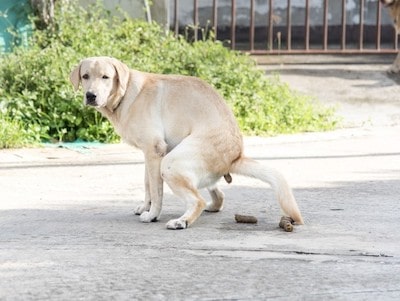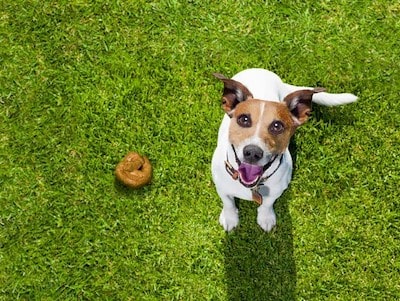Have you ever found yourself wrinkling your nose in disgust as you clean up after your furry friend? If you’ve been wondering, “Why does my dog’s poop smell so bad?” you’re not alone. Foul-smelling dog poop can be an unpleasant and puzzling issue for pet owners, leaving them searching for answers and solutions.
In this article, we will delve into the world of canine digestion and explore the factors that contribute to that unmistakable and offensive odor emanating from your dog’s poop. From dietary influences to underlying health conditions, we’ll leave no stone unturned in our quest to uncover the causes behind this smelly situation.

Understanding why your dog’s poop smells bad is crucial for maintaining their overall health and well-being. It can provide valuable insights into potential health problems or dietary adjustments that may be necessary. Additionally, by addressing the issue, you can regain some peace of mind knowing that your dog’s digestive system is functioning optimally.
So, if you’re ready to decode the mysteries of the pungent problem and discover practical solutions, join us on this informative journey as we shed light on the question: “Why does my dog’s poop smell so bad?”
6 Possible Reasons Why Does Dog’s Poop Smell So Bad
Dog poop naturally has a strong smell, but sometimes it can be more offensive than normal. This can be due to various reasons, such as:
Poor Diet
One of the most common causes of smelly poop in dogs is a poor diet. A poor diet can affect your dog’s digestion and poop quality, making it bulky, slimy, and foul-smelling. Some examples of inappropriate foods or ingredients for dogs are:
- Human food, especially spicy, fatty, or sugary foods
- Dairy products, such as milk, cheese, or ice cream
- Grains, such as wheat, corn, or soy
- Low-quality or expired dog food
- Mouldy or rotten food
To avoid this problem, you should choose a healthy and balanced diet for your dog that meets their nutritional needs and suits their age, size, and activity level. You should also avoid giving them table scraps or treats that are not designed for dogs.
If you want to change your dog’s diet, do it gradually over a few days to prevent digestive upset. And always check the expiration date and quality of the dog food before feeding it to your dog.
Malabsorption Problems
Another possible reason why your dog’s poop smells so bad is that they have a malabsorption problem. This means that their body is not able to absorb the nutrients from their food properly, and this can lead to foul-smelling poop that resembles sour milk or rotten food. Some conditions that can cause malabsorption problems in dogs are:
- Pancreatitis, which is an inflammation of the pancreas
- Inflammatory bowel disease (IBD), which is a chronic inflammation of the intestinal lining
- Small intestinal bacterial overgrowth (SIBO), which is an excessive growth of bacteria in the small intestine
Some signs and symptoms of malabsorption problems in dogs are:
- Weight loss
- Increased appetite
- Greasy or oily poop
- Flatulence
- Abdominal pain
- Vomiting or diarrhea
If you suspect that your dog has a malabsorption problem, you should take them to the vet for a proper diagnosis and treatment. The treatment may include medication, dietary changes, supplements, or surgery, depending on the cause and severity of the condition.

Parasites
Parasites are another common cause of smelly diarrhea in dogs. Parasites are organisms that live in or on your dog and feed on their blood or nutrients. Some of the most common parasites that can affect dogs are:
- Hookworms, which are worms that attach to the intestinal wall and suck blood
- Roundworms, which are worms that live in the intestines and feed on partially digested food
- Tapeworms, which are flat worms that live in the intestines and absorb nutrients from the food
- Whipworms, which are worms that live in the large intestine and cause inflammation and bleeding
- Coccidia, which are single-celled parasites that infect the intestinal cells and cause diarrhea
- Giardia, which are single-celled parasites that infect the small intestine and cause diarrhea
Parasites can cause smelly diarrhea in dogs because they irritate the intestinal lining, interfere with digestion, and produce waste products. Some symptoms of parasite infection in dogs are:
- Weight loss
- Poor coat condition
- Anemia
- Dehydration
- Worms or eggs in the poop or around the anus
To prevent and treat parasite infection in dogs, you should deworm your dog regularly with the help of your vet. You should also keep your dog’s environment clean and sanitary, and avoid contact with feces from other animals.
Parvovirus
Parvovirus is a highly contagious and potentially fatal viral infection that affects dogs, especially puppies. Parvovirus attacks the intestinal cells and causes severe and bloody diarrhea in dogs. The diarrhea has a very strong and unpleasant odor because of the blood and tissue damage. Some other symptoms of parvovirus in dogs are:
- Fever
- Lethargy
- Loss of appetite
- Vomiting
- Dehydration
- Shock
Parvovirus is transmitted through direct contact with infected dogs or their feces. It can also survive in the environment for a long time and contaminate soil, water, food bowls, toys, bedding, etc. Parvovirus is very difficult to treat once it develops, and many dogs die from it.
The best way to protect your dog from parvovirus is to vaccinate them as recommended by your vet. You should also keep your dog away from sick or unvaccinated dogs and clean their environment with bleach.
Exocrine Pancreatic Insufficiency (EPI)
Exocrine pancreatic insufficiency (EPI) is a condition where the pancreas does not produce enough digestive enzymes to break down food properly. This results in undigested food passing through the intestines and causing greasy and rancid-smelling poop in dogs. Some causes of EPI in dogs are:
- Chronic pancreatitis
- Pancreatic cancer
- Pancreatic atrophy
- Genetic defects
Some signs and symptoms of EPI in dogs are:
- Weight loss
- Increased appetite
- Coprophagia (eating poop)
- Flatulence
- Abdominal pain
If you think that your dog has EPI, you should take them to the vet for a blood test to measure their pancreatic enzyme levels. The treatment for EPI involves giving your dog enzyme supplements with every meal to help them digest their food better. You may also need to change their diet to a low-fat and high-fiber one to reduce stress on their pancreas.
Food Allergies
Food allergies are another possible reason why your dog’s poop smells so bad. Food allergies are an abnormal immune response to certain foods or ingredients that cause inflammation and irritation in the digestive system. Some common food allergens for dogs are:
- Beef
- Chicken
- Dairy products
- Eggs
- Wheat
- Soy
Food allergies can cause digestive problems and smelly poop in dogs because they damage the intestinal lining and allow bacteria and toxins to enter the bloodstream. Some other symptoms of food allergies in dogs are:
- Itchy skin
- Ear infections
- Hot spots
- Hair loss
- Vomiting or diarrhea
To diagnose food allergies in dogs, you need to do an elimination diet with the help of your vet. This involves feeding your dog a novel protein source (such as venison or rabbit) and a carbohydrate source (such as potato or rice) for several weeks and then reintroducing potential allergens one by one until you find the culprit. The treatment for food allergies involves avoiding the offending food or ingredient permanently.
How to Reduce Dog Poop Smell
There are some steps you can take to reduce the smell of your dog’s poop and make it easier to handle. Here are some tips:
- Feed your dog a high-quality diet: Choose a dog food that is appropriate for your dog’s age, size, breed, and activity level. Avoid foods that are too rich, spicy, or contain ingredients that your dog is allergic or sensitive to. You can also add some probiotics or digestive enzymes to your dog’s food to help improve their gut health and digestion.
- Keep your dog hydrated: Make sure your dog has access to fresh water at all times. Water helps flush out toxins and waste from your dog’s body and keeps their stool soft and easy to pass.

- Groom your dog regularly: Brush your dog’s coat and trim their fur around their anus to prevent fecal matter from sticking to their fur. You can also use a mild shampoo or wipes to clean their rear end if needed. If your dog has long hair or floppy ears, you may also need to clean their ears regularly to prevent infections or odors.
- Express your dog’s anal glands: If your dog has problems with their anal glands, you may need to express them manually or have a vet do it for you. This can help prevent infections or impactions and reduce the odor from these glands.
- Clean up after your dog: Always pick up your dog’s poop as soon as possible and dispose of it in a sealed bag or bin. You can also use a pooper scooper or a hose to remove any traces of poop from the ground. You may also want to use some baking soda or vinegar to neutralize the smell in your yard or patio.
When to See a Vet
Sometimes, your dog’s poop smell may indicate a serious problem that requires veterinary attention. You should see a vet if:
- Your dog’s poop smell changes suddenly or drastically
- Your dog’s poop has blood, mucus, worms, or foreign objects in it
- Your dog has diarrhea, constipation, vomiting, weight loss, or other signs of illness
- Your dog’s anal glands are swollen, red, painful, or leaking
- Your dog is scooting on the floor or licking their anus excessively
Your vet will examine your dog and perform some tests to diagnose the cause of their poop smell and prescribe the appropriate treatment. Depending on the condition, your vet may recommend medication, surgery, dietary changes, or other interventions.
Conclusion
Dog poop smell is something that every dog owner has to deal with at some point. While it is normal for dog poop to have a strong odor, sometimes it can be more unpleasant than usual due to various factors.
By feeding your dog a high-quality diet, keeping them hydrated and groomed, expressing their anal glands if needed, and cleaning up after them promptly, you can reduce the smell of their poop and keep them healthy and happy.
However, if your dog’s poop smell is abnormal or persistent, you should see a vet as soon as possible to rule out any serious problems.

Ellis is a retired veterinary technician and full-time contributor at DogLovesBest. He likes writing about pet health care tips and reviews the products that are useful for fidos on a daily basis.
Ellis also guardians a Siberian husky, Nova, and a cat named Shilly. They all live happily with his wife Ammy, and both the dogs on a seaside apartment in Queens, NY.
